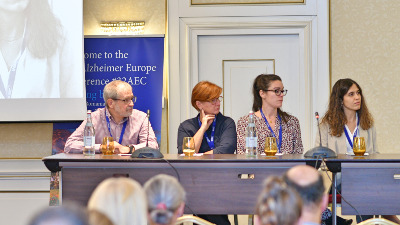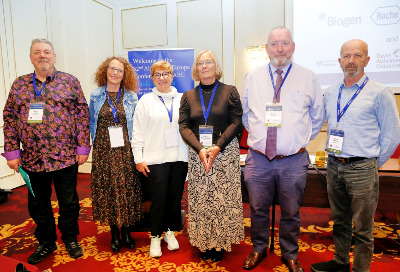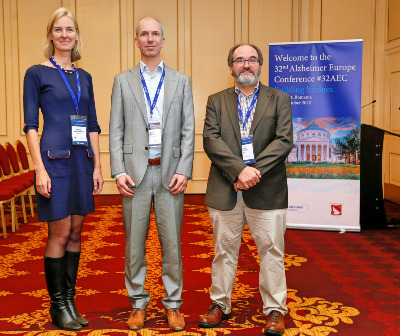|
Bucharest, 19 October 2022 – The second day of the 32nd Alzheimer Europe Conference (#32AEC) “Building bridges”, on 18 October 2022, focused on the impact of the COVID-19 pandemic, and on brain health and prevention.
Moving beyond the COVID-19 pandemic
 The second plenary of the conference was on “Moving beyond the COVID-19 pandemic” and was chaired by Alzheimer Europe Vice-Chairperson Charles Scerri. The second plenary of the conference was on “Moving beyond the COVID-19 pandemic” and was chaired by Alzheimer Europe Vice-Chairperson Charles Scerri.
Bernd Heise, Vice-Chairperson of the European Working Group of People with Dementia (EWGPWD) shared his lived experience of adapting to the COVID-19 pandemic as a person with dementia. He was keen to emphasise that people with dementia are still individuals and have valuable knowledge to share. Despite the difficulties and hurdles encountered due to the pandemic, he continues to stay as active and as healthy as possible, and intends to do so for as long as possible. “I will not give up!” he concluded.
Clarissa Giebel from the University of Liverpool was next to take the floor, with her presentation “Who cares for the carers? The long-term impacts of the pandemic on dementia carers”. She highlighted the extent to which carers have been neglected, not only during the pandemic but also before it and since. Most are without any respite or support, she pointed out, and insisted that "now, more than ever, we need to put support systems in place that support the carer in their own right, as an individual with their own needs, to live well and support the person they care for to continue to live well."
The final speaker in this plenary session was Brigitte Juraszovich, Senior Health Expert at the Austrian Public Health Institute, who spoke about implementing the Austrian dementia strategy during the COVID-19 pandemic. She began by saying that, during the pandemic, most of the support and communication with people with dementia took place online, and that participation of people affected by dementia in the implementation of the dementia strategy worked quite well, via online discussions and video conferences. Indeed, she and her colleagues found that “involving people affected by dementia in strategic processes leads to targeted and needs-based planning and implementation of measures” and that “their involvement was especially valuable during the pandemic, where it was crucial to develop solutions tailored to the needs of different target groups in a constantly changing and uncertain environment.” It came to light that one of the most important issues for persons with dementia and their carers was, that ‘health’ needed to be viewed and discussed in a comprehensive way (bio-psycho-social-approach), with any impact of measures and interventions on social relationships and connectedness being vital to take into account (e.g. avoiding loneliness and social isolation).
After the plenary, delegates were able to view poster presentations, exhibited in the conference centre and to speak to poster presenters about their research. They also had the chance to join one of five parallel sessions. There was one on brain health and dementia prevention, one on residential care and one on young onset dementia. Another, was organised by the RECage project (REspectful CAring for the AGitated Elderly), in which the project conclusions were shared, while the final session was an opportunity for delegates to hear a series of 12 Quick Oral Presentations.
"Building bridges, our voices, our lives” – a special symposium by the European Working Group of People with Dementia
 One of the highlights of the second day of the Alzheimer Europe Conference was a special symposium organised by the European Working Group of People with Dementia (EWGPWD). One of the highlights of the second day of the Alzheimer Europe Conference was a special symposium organised by the European Working Group of People with Dementia (EWGPWD).
The symposium was chaired and facilitated by the current Chairperson of the EWGPWD, Chris Roberts (United Kingdom - Wales). The four speakers at the session discussed how different aspects of their lives had been affected by dementia and how they are “building new bridges” to try to improve their lives and those of others. The speakers were:
- Vice-Chairperson Kevin Quaid (Ireland), who spoke about the relevance of a proper and timely diagnosis of dementia. He referred to his own experience of a diagnosis of a less common type of dementia (Dementia Lewy Bodies).
- Erla Jόnsdόttir (Iceland) shared her experiences related to dementia and employment. In particular, she told the audience how she experienced the transition from being an active person in the working place to suddenly lacking a specific role or purpose in everyday life.
- Nigel Hullah (United Kingdom) discussed the contribution of people with dementia to different aspects of research, policy- and service-development relevant to them. He drew on the concept of “co-production”.
- Angela Pototschnigg (Austria) talked about the importance of having a stable connection, “a bridge”, between people with dementia and their relatives and carers. She feels it is her task to maintain and create connections, by informing others about her everyday life with memory problems. Lieselotte Klotz (EWGPWD member from Germany) supported Angela with the translation from German to English.
Chris Roberts said:
“Our symposium at the Alzheimer Europe Conference was an hour long and was organised and written by ourselves, members of the EWGPWD. Using our collective knowledge and personal experiences to speak about the ‘bridges’ we have built during our diagnosis, whether it be: accepting our diagnosis and learning/adapting to live with it; building bridges with families and professionals to help them understand and work with us for better quality of life for all and to further research/projects that might not help us directly, but might help future generations; or building the bridges needed to alleviate the stigma and assumptions that surround everyone living with life-changing diagnoses which lead to dementia.”
“I’m very proud to be the Chair of a group of amazing individuals who, through adversity, have not only become great friends but inspirational members of the EWGPWD, working closely with Alzheimer Europe.”
Following this and a simultaneous symposium organised by the Davos Alzheimer’s Collaborative, conference attendees had the choice of a further five parallel sessions, one of which was an “Intellectual Disability and Dementia ‘Meet and Greet’ Roundtable”. This discussion session was organised by Karen Watchman from the University of Stirling, Scotland, and Matthew Janicki from the National Task Group on Intellectual Disabilities and Dementia Practices (NTG), USA. DISTINCT (Dementia: Intersectorial Strategy for Training and Innovation Network for Current Technology) organised a session in which it shared the main findings its projects on technology to promote social health, while the other three parallel sessions covered issues around gender, sex, and sexuality; COVID-19 and dementia; and dementia strategies.
Brain health and prevention
 The third plenary of the conference covered topics related to brain health and prevention, and was chaired by Marjolein de Vugt from Alzheimer Center Limburg, Netherlands. A presentation on “Increasing awareness of dementia prevention through public campaigns” was delivered by Jan Steyaert, Scientific Officer at the Flemish centre of expertise on dementia and Professor in the department of social sciences at the University of Antwerp, Belgium. He explained that research over the past decade has clearly shown that there are modifiable risk factors for dementia and that “We can slow down the future increase of dementia by focusing on these.” He pointed out that this adds a third challenge to the work being done in this area, because, in addition to developing good dementia care and looking for pharmaceutical solutions, it is also clear that it is necessary to work on primary prevention, on promotion of a brain healthy lifestyle. “As dementia care organisations, we need to outreach and build strategic alliances with public health organisations on a local and (inter)national level”, he said. The third plenary of the conference covered topics related to brain health and prevention, and was chaired by Marjolein de Vugt from Alzheimer Center Limburg, Netherlands. A presentation on “Increasing awareness of dementia prevention through public campaigns” was delivered by Jan Steyaert, Scientific Officer at the Flemish centre of expertise on dementia and Professor in the department of social sciences at the University of Antwerp, Belgium. He explained that research over the past decade has clearly shown that there are modifiable risk factors for dementia and that “We can slow down the future increase of dementia by focusing on these.” He pointed out that this adds a third challenge to the work being done in this area, because, in addition to developing good dementia care and looking for pharmaceutical solutions, it is also clear that it is necessary to work on primary prevention, on promotion of a brain healthy lifestyle. “As dementia care organisations, we need to outreach and build strategic alliances with public health organisations on a local and (inter)national level”, he said.
Primary prevention of dementia was the focus of the next speaker, Edo Richard from the Radboud University Medical Centre, Nijmegen, Netherlands. In answer to the question “What is the way forward, in primary prevention?” his presentation showed that, where dementia risk factors are concerned, lower may not always be better and that “we need to rethink the design and evaluation of individual dementia risk reduction strategies.”
The final presentation in Plenary was called “From assessing risk to communicating risk” and was given by Wiesje van der Flier, Scientific Director of the Alzheimer Center Amsterdam. She emphasised that “risk and probabilities can be difficult for patients to understand, and equally difficult for clinicians to explain. Yet, patients increasingly want information and clinicians need tools and training to support them in communicating risk.” She also noted the importance of learning from other fields that have experience with communicating risk and the inherent uncertainty that comes with it, such as oncology or cardiology. Best practice examples include use of plain language, precise numerical risks, and graphical representation, she noted. She also said that the “teach-back" method helps to check understanding. Finally, she stressed that “in the debate about communicating risk based on biomarker information, we often tend to forget that there is particular value in negative biomarkers giving a powerful message that risk of progression is low.”
The conference programme for day two ended with a special symposium on “Rethinking the early detection and diagnosis of Alzheimer’s disease”, organised by the European Brain Council and the European Federation of Pharmaceutical Industries and Associations (EFPIA) and featuring Kevin Quaid, Vice-Chairperson of the EWGPWD.
Alzheimer Europe would like to extend a warm welcome to all delegates and remind everyone to use the hashtag #32AEC to join/follow the conversation on Twitter.
For further information, contact:
Jean Georges, Executive Director of Alzheimer Europe, 14, rue Dicks, L-1417 Luxembourg, Tel.: +352-29 79 70, Fax: +352-29 79 72, jean.georges@alzheimer-europe.org
Notes to editors:
Alzheimer Europe is the umbrella organisation of national Alzheimer associations and currently has 41 member organisations in 37 European countries. (www.alzheimer-europe.org).
The European Working Group of People with Dementia (EWGPWD) was launched by Alzheimer Europe in 2012. It is composed entirely of people with dementia, nominated by their national Alzheimer associations. They work to ensure that the activities of Alzheimer Europe reflect the priorities and views of people with dementia. The group operates independently and the Chairperson is also on the Board of Alzheimer Europe. (/www.alzheimer-europe.org/Alzheimer-Europe/Who-we-are/European-Working-Group-of-People-with-Dementia) |